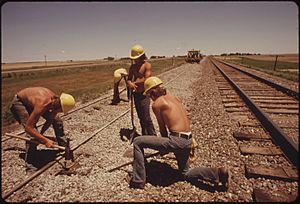Labour (economics) facts for kids
Labour is a word for the work that people do. It's about the effort and skills humans use to create things or provide services. Think of it as the human power behind making everything we use, from building houses to teaching in schools.
In economics, which is the study of how people make and use money and resources, labour is super important. It's one of the three main "factors of production". These factors are the basic things needed to produce goods and services.
The other two factors are:
- Land: This means all natural resources, like the ground we build on, the water we drink, and the minerals we dig up.
- Capital: This refers to the tools, machines, buildings, and money used to produce things.
Labour is also known as human capital. This term describes the skills, knowledge, and experience that workers have. It's not just about the physical work, but also the brainpower and training that people bring to their jobs.
Contents
What Is Labour?
Labour is the human effort used in producing goods or services. It includes both physical and mental work. For example, a builder uses physical labour to construct a house. A computer programmer uses mental labour to write code.
Every job, from a doctor to a farmer, involves some form of labour. It's how people contribute to the economy.
Labour as a Factor of Production
In economics, the "factors of production" are the ingredients needed to make things. Imagine you want to bake a cake. You need ingredients (like flour and sugar), an oven, and someone to bake it.
- The ingredients are like land (natural resources).
- The oven is like capital (tools and equipment).
- The person baking the cake is using labour (human effort and skill).
Without labour, nothing would get made or done. It's the active part of production.
Different Kinds of Labour
Labour can be divided into many types. Some jobs require lots of physical strength. Others need a lot of education and special skills.
- Skilled labour involves workers with special training or education. Examples include doctors, engineers, and teachers.
- Unskilled labour involves tasks that do not require much special training. Examples include basic cleaning or simple assembly line work.
Both types of labour are important for an economy to function.
How Labour Is Paid
When people provide labour, they usually get paid for it. This payment is often called a wage or a salary.
- Wages are typically paid by the hour or by the day.
- Salaries are usually a fixed amount paid over a longer period, like a month or a year.
The amount someone earns depends on many things. These include their skills, education, the demand for their job, and the industry they work in.
Related Concepts
Labour Market
The labour market is where workers and jobs meet. It's like a marketplace where people offer their skills (supply of labour) and businesses look for workers (demand for labour).
When there are many jobs available and not enough workers, wages might go up. When there are many workers but not enough jobs, wages might go down.
Labour Unions
Sometimes, workers join together to form labour unions. These groups help workers negotiate for better pay, safer working conditions, and fair treatment. They act as a single voice for many employees.
For example, a union might talk to a company's management about increasing wages for all its members.
Images for kids
-
Job advertisement board in Shenzhen
See also
 In Spanish: Economía laboral para niños
In Spanish: Economía laboral para niños
 | Percy Lavon Julian |
 | Katherine Johnson |
 | George Washington Carver |
 | Annie Easley |





